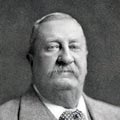The Wreck at Juan Fernandez, Part 5
Once when Larson was loading lobsters into the Juan Fernandez, as we called our little schooner, Josh Slocum, the skipper of the famous Spray cutter, visited the island.
“Larson,” he said, “yon’s a bonnie little boat, although she’s only 17 tons. Built of oak and pretty near as broad as she’s long, you need never fear facing any sea on the surface of the globe in her, if you’ll only do as I tell you. When foul weather threatens, don’t wait till the storm is on you, but heave to, and out with the oil bags. At sunset, if the wind freshens, heave to and read or smoke in comfort. The sea need never trouble you. All you have to fear is whales.” I thought this was very excellent advice.
Slocum took a big lump of sandstone away with him, from Alexander Selkirk’s cave. He said he intended to make good money on it when he returned to New York. “Every guy who wants to see it, will have to pay half a dollar,” he declared; and those who wish to sit on it must shell out double.” £20,000 was, I believe, the sum he expected to receive over his trip round the globe.
Slocum’s mention of smoking in comfort reminds me of a laughable instance in which old Harry figured. We had left Valparaiso on November 30. It doesn’t signify what year. I only mention the month, because, in that part of the world, summer begins on November 1, and I like folk to understand the atmospheric conditions that prevailed on the occasion under notice. Four days out, we got becalmed, so I amused myself by diving and swimming in the sea. A long line was attached to my body, and fastened to the ship’s ladder, so that in an emergency I could haul myself in pretty quick. “Sharks?” Well, yes, they are inclined to be playful at times.
A day or so after, the breeze sprang up and we got a move on. Old Harry was sitting on the rails smoking his pipe. Larson cried out to him, “Ahoy, there! Mind you don’t get a bath with all your clothes on.” Harry laughed, and grunted “I’ve done this sort of thing, man and boy, for fifty year and more, without falling off, and I ain’t likely to do it now.” Whether he dozed or not, I can’t say, but less than half an hour later we heard a great “plop,” and lo! and behold! there was our poor old friend struggling in the sea, and fast drifting astern. He had slipped off his perch with his pipe in his mouth! I chucked him a rope, and we soon hauled him back again.
Two days passed and then we sighted a school of whales. One big fellow kept close company with us for a couple of hours, diving first one side, then the other of the ship. Being longer than our craft, we were fearful lest he might capsize us. Larson suggested I should get my rifle, and take pot shots at him. He thought that would frighten the monster fish away. I had, however, good reason to know better, for I had only lately been reading an account in the Liverpool Mercury of how a whale served a ship when treated in that fashion. It was headed in big black letters, and narrated that after a passenger had fired off twice, the whale turned and charged the vessel repeatedly. If my memory serves me, the boat referred to was a big Yokohama steamer. When I showed the paper to Larson, he said, “Oh, that would never do! The whole caboodle might come for us, and then where should we be?” So he hove to, for, I suppose, about a couple of hours, during which the whale continued to frolic around, but each time it dived it increased its distance from us, until finally it got lost to sight. So we reached Juan Fernandez without mishap.
Formerly, sandalwood was very plentiful on the island, but of late it has become extremely scarce. Smart walking sticks are manufactured of it. I had two dozen made for me—one stick I gave to my father, one I passed on to Lutges, and one I retained for myself. The remainder I disposed of to dealers in Valparaiso at £2 apiece. and they got fancy prices for them.
Cranberries, myrtles, strawberries and raspberries grow wild in many parts of Juan Fernandez. It is said strawberries originated in Chile. That is the opinion held by several learned botanists at any rate. According to island tradition, however, the Chilian varieties were developed from the wild ones of Juan Fernandez. The island berries are about the size of Royal Sovereigns. There are two sorts, white and red. They grow quite wild. They are not looked after and cultivated by expert horticulturists like my friend James Reynolds; and yet I have never seen any English berries to equal them in appearance or flavour.
The wild cherries also are very fine. As for the figs, on one occasion H.M.S. Amphion put in at the island for a matter of three days. Several of her officers, including Captain Phyllis—now Admiral—Commander Hawke, and Lieut. Browell—son of General Browell—spent most of their time with me. They said they had never tasted such luscious figs, not even in Smyrna.
